Queensland lockout laws: Why young will fight for right to party
AT 2am Fortitude Valley mall becomes a boxing ring. A laneway doubles as an emergency ward, the number of unconscious people is countless, and police are swarming. And everyone else keeps partying. This is a normal night in the Valley.
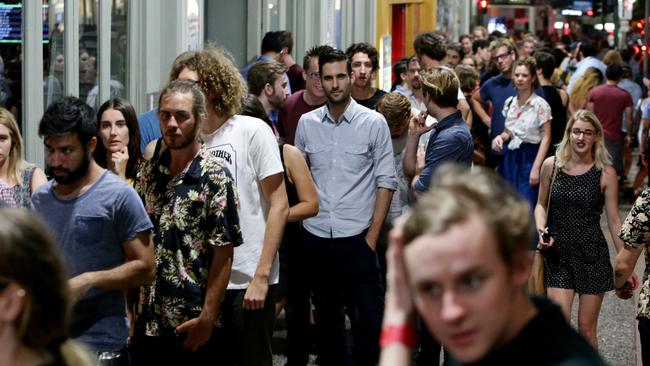
QLD News
Don't miss out on the headlines from QLD News. Followed categories will be added to My News.
THE giant with the short-cropped red hair has gone all Braveheart.
He’s wearing stock-standard jeans and a button-up shirt, but in his mind’s eye he must have long flowing locks and be carrying a sword and metal shield; he must be charging into battle against evil invaders.
Red Hair has just been accused of spitting in the face of a manager at superclub Cloudland. Predictably, that’s led to a forceful response from club security. Four bouncers, muscles straining through white business shirts, wrestle him to the ground on the edge of one of Ann St’s three lanes and sit on his back, waiting for police. Oncoming cars swerve to avoid the mass of bodies. Resistance is pointless, but the longer they hold him the more he thrashes about.
LAST DRINKS: Quick guide to lockout laws
“Let me go,” he screams, “let me go, let me go, let me go, lemmego, lemmego, lemmegoooooo”.
Police arrive en masse and he goes even more berserk. He’s trying to take them all on: the bouncers, the cops, the invisible invading army. A sergeant says he’s been spat on too and peels off to rinse his eyes.
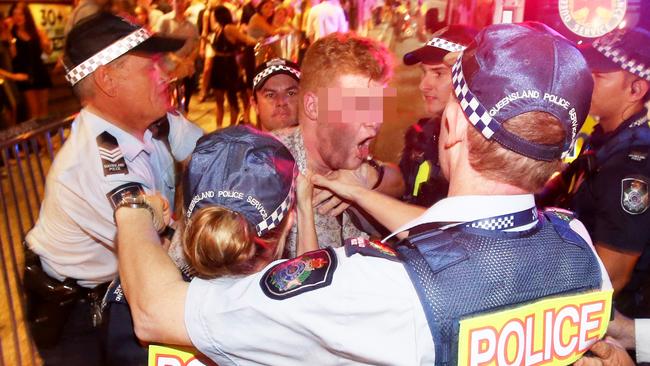
Simultaneously, paramedics and chaplains scoop up an unconscious young woman from the footpath outside the club and stretcher her into an ambulance.
The night didn’t start like this, and won’t end like it for the vast majority, but here we are, early on a Sunday morning, on the eve of new laws designed to tackle alcohol-fuelled violence.
From July, last drinks across Queensland will be at 2am, or 3am in party precincts. Significantly, casinos will be exempt. Shots and other “rapid consumption drinks” will also be banned after midnight.
The next, most controversial, phase will begin on February 1, 2017, when a new “lockout” will bar anyone from entering venues after 1am. Mel Gibson, who as Braveheart’s painted-face warrior William Wallace uttered the immortal line “they can take our lives, but they can never take our freedom”, would be horrified. So, are the changes necessary, will they work, and why are we such violent drunks anyway?
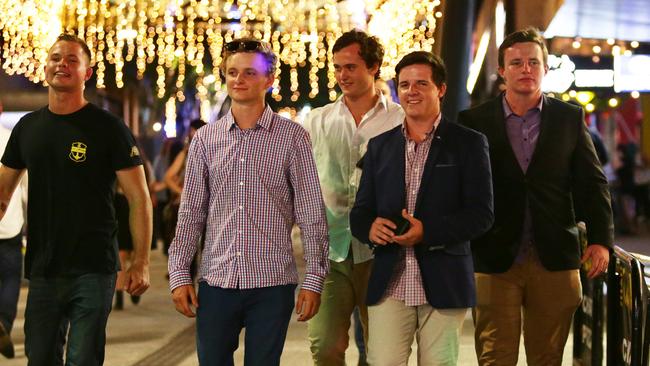
FORTITUDE VALLEY – 9pm to 11pm
FIVE young men in check shirts, chino pants and suit jackets make a beeline for the photographer.
A day at the races has merged into a night in the Valley and the camera’s oversize lens has drawn them like moths to a flame.
They’re all 19, happily tipsy and want to be in a photo.
“F..k the lockout laws. Wooooooo,” one roars when he finds out we’re there to talk alcohol and violence.
“It’s bullshit man. It’s so stupid,” adds one of his friends.
“Holy f..k man. Holy f……k,” interrupts another from the group, eyes fixed on a voluptuous Kim Kardashian-lookalike in a sheer, figure-hugging dress.
The current dress code in the Valley appears inspired by the ubiquitous Kardashians and could otherwise be described as “less is more”: Less clothes, more cleavage. Even that doesn’t distract the group for long. Impending new lockout laws have everyone fired up, and one by one their heads snap back to talk about the futility of locking them out of bars and shutting venues early.
“Unfortunately,” says one, “there’s a few in the bunch that ruin it for the rest of us. None of us are going to start a fight with anyone, but every now and again some f..wit is going to king hit someone or hurt someone . There’s nothing you can do about it. It doesn’t matter when you close the clubs, it’s going to happen.”
As they walk away, one turns to add: “Make sure it’s anti-lockout.”
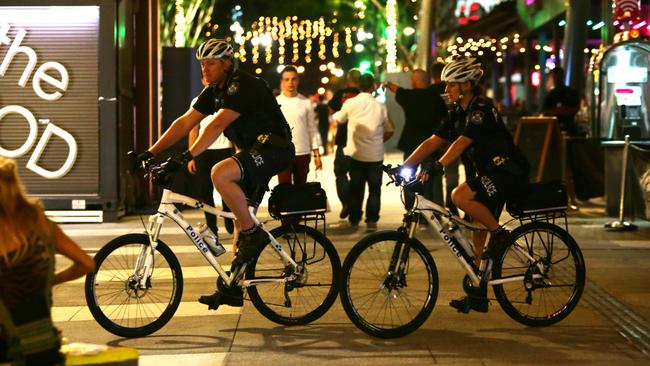
The new laws were a Labor election promise and have also been a personal crusade of one the party’s new MPs, Dr Anthony Lynham, a maxillofacial surgeon who entered politics with the stated aim of reducing the number of assault victims he was seeing on the operating table.
“With these laws we will reliably see a one-third reduction in young people turning up in an emergency department on a Friday and Saturday night after assaults,” Lynham pledged when state parliament passed the laws in February.
The State Government, backed by the medical profession, says the figures speak for themselves about the state’s toxic relationship with alcohol.
In 2014-15, there were 11,241 alcohol-related emergency department presentations. There were 45,197 alcohol-related hospitalisations in the same year, a 38 per cent increase in four years.
Queenslanders’ consumption of 11.03 litres of pure alcohol per year – compared to the national average of 10.42 litres – fed more than 200 different health conditions such as cancer, cardiovascular disease, liver cirrhosis and pancreatitis.
Meanwhile, for all the talk about illegal drugs, one in three people treated at rehab centres were there primarily because of alcohol. Ambulance officers responded to 4151 overdose cases where alcohol was the primary drug in 2012/13. And 24 people died from “king hit” deaths in Queensland between 2000 and 2012, with alcohol a major contributor.
Alcohol-related presentation at Townsville Hospital’s emergency department rose from 574 in 2011 to 802 last year. In Cairns, a third of all assaults in the past two years involved alcohol. Three people a day on average presented to Cairns Hospital emergency department for treatment of alcohol-related injuries.
Professor Peter Miller of Victoria’s Deakin University virtually guaranteed savings on hospital beds and police cells in a submission to a Queensland parliamentary inquiry last year.
“As the lead investigator of the two largest studies ever conducted into alcohol-related harm around night-time economies,” Prof Miller wrote, “I can state that the proposed conditions around the availability of alcohol and extending trading hours will decrease costs to the community. The evidence is overwhelming.”
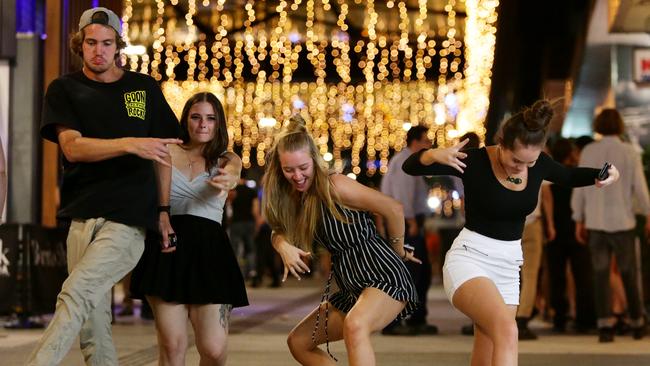
But the changes haven’t been received well by the younger demographic they are meant to protect, like the three 18-year-old women from Logan who are the next to spot our camera in the Valley and also want a photo.
“Pleeaase. You have to. I swear to God,” one squeals.
They’ve come in on the train, are bound for superclub The Met on Wickham St, and plan to stay out until 5am close and then head home on one of the first trains. It’s become a weekly ritual.
What were they doing before they came out?
“Predrinking,” says one, rattling off a cocktail that involves absinthe and cranberry juice.
How many drinks had they had?
“The whole cask,” she laughs.
“You know how everyone’s going on about the Valley being so bad?” she says. “It’s not. We’ve only ever seen one fight and we’ve been out for the last five weekends straight. We feel safe in the Valley.”
A male friend, 19, is with them and clarifies: “Girls are safe.”
Men, on the other hand, only have to look the wrong way or bump the wrong person and it’s on.
“I don’t think its alcohol to be honest,” he says. “I think it’s them. The way they are raised. They just want to fight. For anything.”
At this time of night, Chinese, Thai and Vietnamese restaurants are still serving up plates of steaming hot food and crowds are still building on the neon-lit streets.
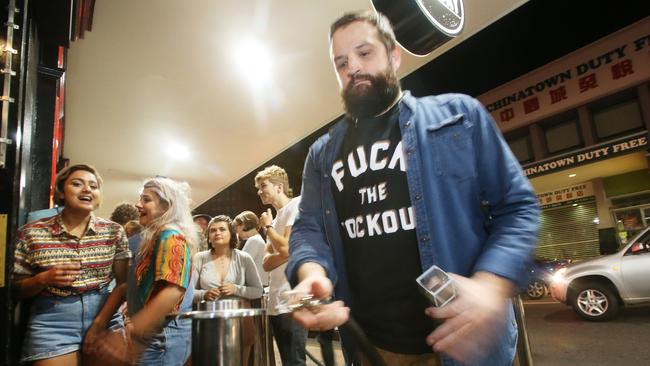
Outside The Foundry on Wickham St, about 100 people are in a tightly-packed but orderly queue, waiting to be ushered inside by a manager wearing a “F..k the lockout” T-shirt.
Near the centre of the mall, music blares out of one of the bars, the Beastie Boys imploring: “You gotta fight for your right to party.”
The next tune out of the speakers is Coolio’s Gangsta’s Paradise: “As I walk through the valley of the shadow of death, I take a look at my life and realise there’s nothin’ left … You better watch how you’re talking and where you’re walking, or you and your hommies might be lined in chalk.” Talk about subliminal messaging.
At the narrow police beat near the bottom end of the Valley mall an officer leans against the wall, making the most of the calm before the storm.
“Come back at 2am,” he says knowingly.
FORTITUDE VALLEY – 11pm to 1am
The next few hours are why almost everything and everyone is here: The cavernous bars and clubs; the pizza joints and kebab shops; the DJs and bar staff; the glamorously dressed door attendants and burly security guards; the nervy paramedics and police. And, of course, the weekly gathering of some 20,000 revellers.
Forget Sundays through to Fridays, or even the earlier hours of tonight. The real party starts now.

Take the newly renovated and renamed bar, Woolly Mammoth, revelling in its status as a hot new club. Sixty per cent of the Ann St bar’s weekly takings are generated after 11pm Saturday. That leaves it vulnerable to succumbing to the fate of its namesake, because a modern night out typically involves movement between venues – a migrating herd looking for greener pastures.
“You can look at the security count on the night,” owner Lachlan Bird says of Saturday nights, “and it can be 50, 60, 100 people. Then it hits 11pm and it goes to 800.”
Then the crowds will move on. Bird says he could live with a 3am close, but the 1am lockout will have dire consequences, cutting his bar off from the wandering herd.
“Kings Cross,” he says. “That will be the outcome for the Valley.”
He’s referring to reports of an 85 per cent drop in late-night foot traffic in the Sydney party precinct after similar laws were introduced, and the closure of more than 40 businesses. Overall, the industry predicts, up to 6000 jobs could be lost in Queensland.
Cloudland, the beautifully fitted out club next door to the Woolly Mammoth, opened at a cost of $9 million a few years back. Owners Lou Bickle and his children are also behind famous Valley venues Family, Press Club, The Empire Hotel and Birdee’s.
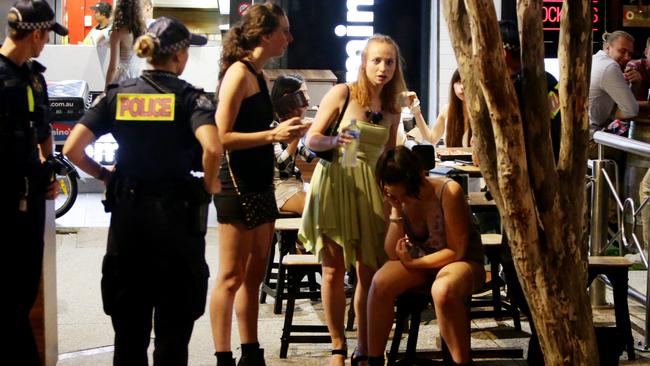
The Bickles spun their Valley success into other ventures and now also run the Victoria Park Golf Course, South Bank Surf Club, Live Fire Steak Bar at South Bank, and developments at Howard Smith Wharves. Last year, Lou bought the Gold Coast’s Islander Resort Hotel for $26.5 million.
Five years ago the family’s patriarch was upbeat, declaring the Valley was on the cusp of an unprecedented boom. He now doubts his venues will survive.
“We want to see this thing solved as much as anybody else does,” Bickle says, readily admitting violence has marred Queensland’s busiest party precinct.
“Coming to the very end of the reign of Campbell Newman we had all the ducks lined up to solve the whole problem, with the right punishment for the badly behaved, we were locking them out, we were throwing them out of the area.
“I don’t really believe that 99 per cent of the public have to suffer because of the inability of the law to adequately deal with the one per cent who don’t know how to behave.”
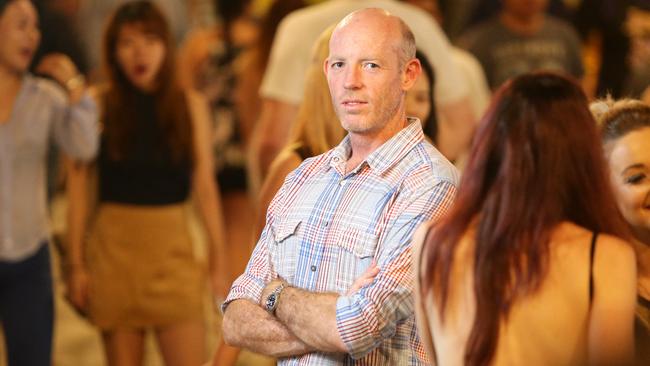
I’ve arranged to meet Simon Turner of the Just Let it Go Foundation at 11pm outside the Royal George Hotel, or RG’s, at the top end of the Valley mall.
A young woman around 20-years-old is sitting with her head in her hands and a pool of vomit at her feet at Domino’s pizza opposite us. She falls off her stool and rolls around in the gunk on the ground as mortified friends frantically arrange to get her home. A veteran bouncer at RG’s shakes his head and mutters: “It’s too early for this.”
One of her friends says they’ve only just come out. Turner says: “That happened because of Dan Murphy’s (the liquor chain), not because of any nightclub. She’s just gone too hard. But we can’t expect young people to be perfect either.”
Turner’s foundation is named after the final words of one-punch victim Bruce Steensen. Four years ago, 53-year-old Steensen was on a night out at the Sunshine Coast’s Mooloolaba when he was punched in the head and died.
Steensen had come across an argument between 23-year-old Jesse James Patrick and a cab driver, and told Patrick to “just let it go”. It was enough to provoke a fatal attack.
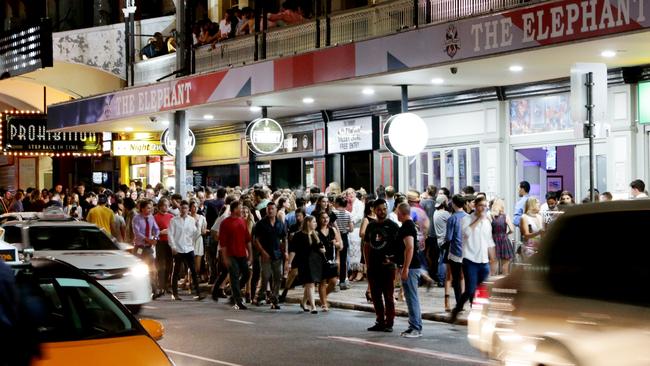
Turner previously led the One Punch Can Kill Campaign for the Queensland Homicide Victims’ Support Group and helped draft new laws increasing the punishment for one-punch killers. He’s convinced nightclubs are the solution, not the problem, and that the State Government is missing a chance to connect with young people.
“This isn’t the devil zone. This is actually something that’s really, really valuable,” says Turner, an artist who spent his youth playing pool and listening to the DJs at the Valley’s Empire Hotel.
“The nightclubs aren’t the necessary evil everyone thinks they are,” he adds. “They’re the ones that have got the clientele we’re looking for.”
Turner agrees that reducing trading hours to 3am may reduce the risk of harm. In fact he says that’s what almost everyone lobbied for when the State Government flagged changes. But the additional lockout “imposes an unnecessary measure on the freedom of young people”. Young people will be driven to casinos, with all the associated gambling harms, and lead to the resurgence of risky house parties.
“If the Government was really concerned, it would be reducing the amount of takeaway licences,” Turner says. “That’s where the risky behaviour comes from. All you gotta be is sober, 18 and be able to pay for it and you can buy as much as you want. You can go and buy four slabs (cartons of beer). But there’s not a single nightclub here where you can go and buy four slabs.”
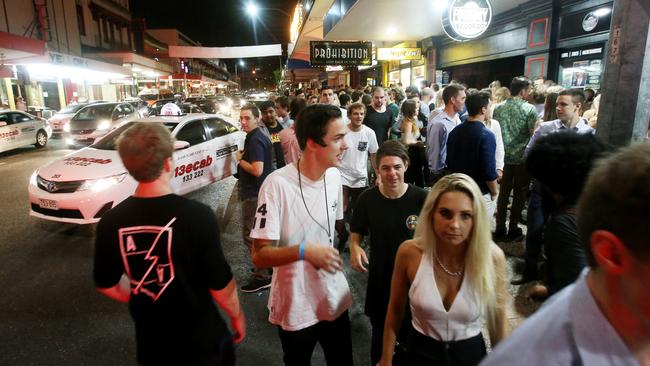
We walk some laps of the Valley. There’s no sign or trouble or even tension. A multi-million dollar upgrade has done little to improve the aesthetics of the mall. It looks like a giant concrete urinal decorated with a few token fairy lights. Not since the council turned King George Square into a concrete baking tray has Brisbane put such a poor design effort into a public space. Turner explains everything in sight has a purpose.
“This is all post 9/11 architecture. This is what anti-terrorism architecture looks like now. It’s a big, open empty space,” he says.
“What they’ve done is removed everything out of it. If you look carefully up there, you’ve got cameras, up there you’ve got cameras, and there. They’re watching everything going on.
“Look at the way the seats are designed – you can see that way, that way and that way. The funding came through all the anti-terror measures.”
Council ticket inspectors hover around the lines outside clubs with police escorts, handing out $235 fines to revellers who drop cigarette butts.
“What that’s based on is what happened in New York – they worked real hard on cleaning the areas, especially around food venues. They found once they did that they were able to improve the standard of behaviour and reduce the risk of harm.”
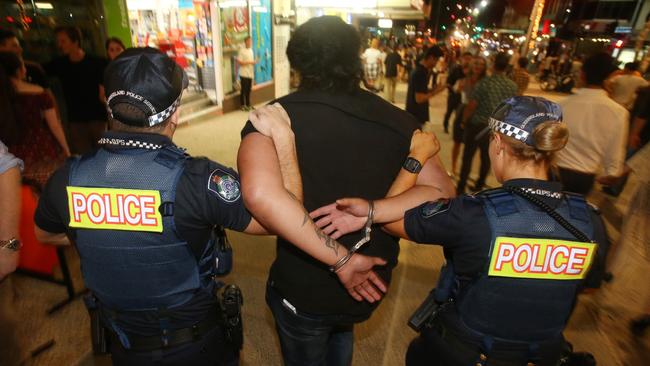
It looks like revenue raising though, and the litter patrols are noticeably absent later in the night when the trouble starts.
To really make entertainment precincts safe, Turner says, involves attention to things like the location of cab ranks. He also says you’ve got to interrupt the dominant culture of binge drinking and macho behaviour, through art and other distractions.
“City councils have a major role in all this. The State Government bullied its way into this argument and placed a measure over the whole state that was only placed on one suburb in Sydney and one small coal town on the central coast. We got it across the whole state, 4.5 million people, whack, one go.”
Turner says nightclubs are a soft target, but there’s a fundamental problem with violence that needs to be addressed that goes beyond alcohol.
“When we look at the police statistics in Queensland,” he says, “assault is the most common crime committed against the person – 66 per cent of crimes against individuals are assault of one form or another.
“That tells us fundamentally we are violent towards each other, and violence is an accepted form of social behaviour in Queensland, always has been.”
Steensen’s death reflects a shift in assault patterns where attacks are no longer kept within age cohorts, and he has a theory for some of what is driving the change, he says.
“You’ve got a young person punching out a guy in their 50s. Where is that kind of behaviour coming from? That’s the video games. That’s the lack of consequence stuff. That’s got nothing to do with alcohol, it’s got nothing to do with precincts.
“The way that young people are fighting,” he goes on, “has everything to do with MMA (mixed martial arts) and UFC (Ultimate Fighting Championship). The fact that they punch them, punch them, punch them to the ground and then jump on them and hit them again. Why aren’t we banning it? Where’s the disadvantage to young people by banning it?”
A growing self-obsession in a narcissistic world and a mindset that no-one else’s problems matter as much as our own is also contributing to the aggression, he says.
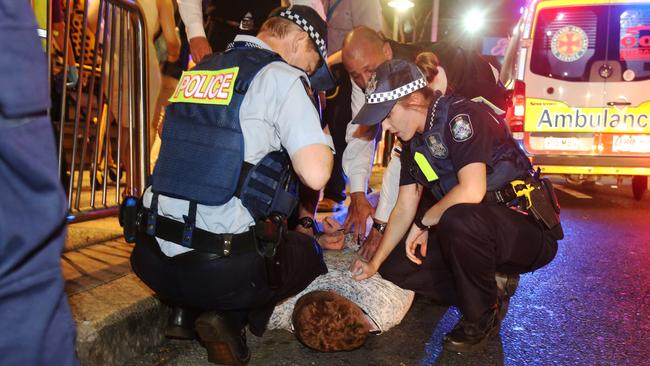
Police Commissioner Ian Stewart is equally concerned with a culture of violence. Mr Stewart created waves earlier this year when he declared Australia’s party precincts were the worst in the world for violence. But notably, he also observes that the same attitudes that lead to street violence are also behind assaults in the home, and is calling for urgent cultural change.
“Society can no longer tolerate people drinking to excess and then using that as an excuse for violence,” Stewart says.
“People are allowed to go out and have fun, but they have to stop ruining it for others. Whether it is in entertainment precincts or behind closed doors at home, drinking is no excuse.
“If people have issues or want to let off steam then they should do that through talking to someone or exercising. If they want to get physical then do it a gym in a controlled environment.
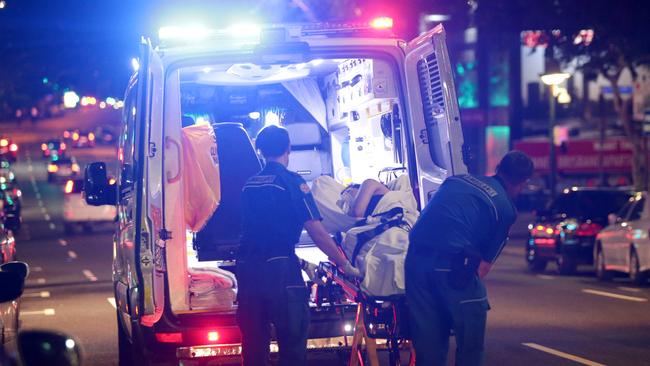
“Innocent bystanders or family members are not punching bags. It concerns me that there is a similar mentality among people who will assault a stranger in the street or a loved one in a family setting. Neither is acceptable and we as a community have to stop it.”
UK anthropologist Dr Anne Fox visited 25 cities and towns in Australia and New Zealand over seven weeks for a study of nightlife culture funded by food and beverage company Lion. Fox concluded in her report, released last year, that Australians were under the delusion alcohol could “hijack their better natures, control their thinking and make them do ‘crazy and stupid things’ ”. She argues that alcohol does not cause disinhibition, “but is a symbol that gives people licence to behave in an uninhibited way”.
In other words, alcohol is used as an excuse for violent behaviour. She points to Iceland, where she says there is a stronger culture of preloading, 24-hours bars, high rates of gun ownership, but almost no recorded violence.
“Alcohol-related violence will not go away by raising or lowering the price of booze; opening bars later or shutting them earlier; restricting or banning advertising,” she wrote.
“Unless the culture of violence changes, violence, in whatever guise, will continue. Efforts at alcohol control will be ineffective if not related to changes in the macho culture of violence.”
Turner says cultural change has to begin well before the legal age to drink. Junior sporting clubs are leading the way by taking a stand against macho behaviour, he says.
As he waves goodbye we spot the first ambulance of the night, heading to the Flying Cock bar on Brunswick St to treat a woman for an unknown condition. A short walk away there’s another ambulance in the centre of the Valley mall with its lights activated. Two women lean up against it to pose for a photo.
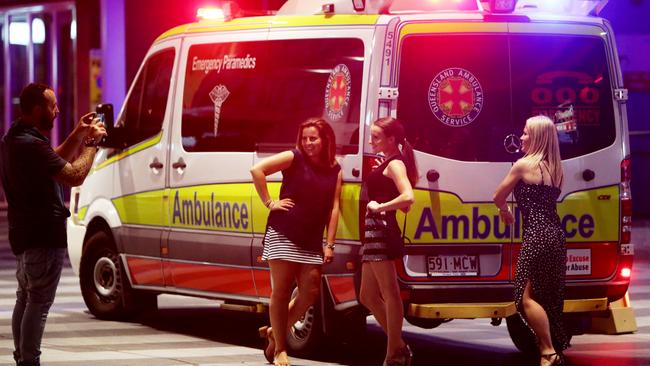
FORTITUDE VALLEY – 1am to 3am
What just happened?
At 1am the night turns. Outside Cloudland, police finally load the angry redhead into the back of a fortified van. He’s 20-years old and will be charged with serious assault of a police officer, common assault and obstructing police. When his case is mentioned in court, his lawyer will ask for an adjournment until late May to allow time for a psychiatric report.
The unconscious young woman beside him has been taken away in the ambulance to an unknown fate. Another ambulance is directly across the road, where paramedics are treating another young woman. Police and paramedics at the same time converge on Crowbar on Brunswick St, where there has been reports of an assault of a bouncer.
At 2am, exactly the time the police officer predicted several hours earlier, the centre of the Valley mall becomes a boxing ring. At least four men have been pulled apart. One has blood on his face. Another’s shirt is torn, exposing his heaving chest. They want to keep it going even when they’re surrounded by police. One officer resorts to pulling out his capsicum spray and aims it at someone’s face, warning him to step back.
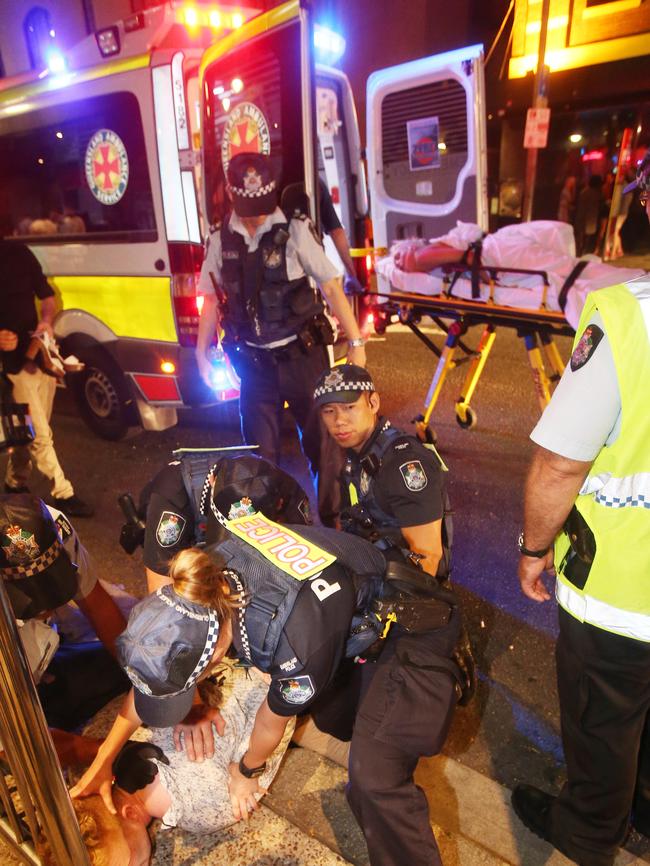
Two men are taken away in handcuffs. Women drop to the ground like dominoes as over-consumption takes its toll - I lose count of the number that are unconscious or semiconscious. At the Met, a nearby laneway doubles as an emergency ward, with the club’s hired paramedics treating the drunk or drunk addled and injured there until an ambulance can arrive. A hulking bouncer gently escorts a “patient” to the lane whose pants keep falling down – once, in days past, the same person would have been simply thrown down a nightclub’s stairs.
Everyone else keeps partying.
FORTITUDE VALLEY – 3am to 5am
The crowds have thinned out. Some stayers kick on, but most people go home. A senior officer is standing in the mall and tells me it’s been a relatively well-behaved night.
Over the course of the night police record 42 separate incidents in Brunswick St alone, ranging from assaults to disorderly behaviour. For thousands of others, the night is event free and the biggest drama will be a hangover.
Two young men who will no doubt be among those with sore heads are sprawled on the ground outside The Met. They can’t get back inside because of the lockout. There’s only one thing for it.
“Let’s go to the cas,” one slurs.



